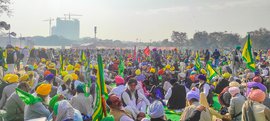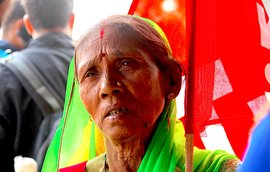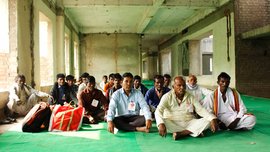‘Who knew, Emergency will return in a new garb
Autocracy these days will be renamed democracy’
In these times, when dissent is suppressed and dissenters are silenced or locked up or both, these lines of a protest song once again rang true as farmers and farm workers – the kisan and the mazdoor – walked into the grounds of the Ramlila Maidan, with red, and green and yellow flags raised high.
Agriculturists across groups – AIKS (All India Kisan Sabha), BKU (Bharatiya Kisan Union), AIKKMS (All India Kisan Khet Mazdoor Sangathan) and other organisations – gathered at the historic grounds to participate in the Kisan Mazdoor Maha Panchayat, held on March 14, 2024 under the unifying platform of SKM (Samyukta Kisan Morcha).
“After the three farm laws were repealed, the government made some promises, but these are still unfulfilled. Now they must fulfil those promises. Varna hum ladenge, aur ladte rahenge [If they don’t, we will fight and continue to fight],” Premamati, a woman farmer from Kalaan village told PARI. She was referring to the Farmers (Empowerment and Protection) Agreement on Price Assurance and Farm Services Act, 2020 , the Farmers’ Produce Trade and Commerce (Promotion and Facilitation) Act, 2020 and the Essential Commodities (Amendment) Act, 2020 .
“We were [also] here for the protest three years ago,” she added. Premamati was one of the three women farmers from Uttar Pradesh’s Shahjahanpur district who had arrived for the Mahapanchayat. They were aligned with the farmers’ group, Bharatiya Kisan Union (BKU). “This government is thriving, but they have ruined the farmers,” she said with anger.
All the women PARI spoke to were small farmers,
working on 4-5 acres of land. Women farmers and labourers do over 65 per cent
of agricultural work in India, but a mere
12 per cent
of women farmers have land in their name.


Left: From left to right, Premamati, Kiran and Jashoda of BKU from Shahjahanpur district, Uttar Pradesh . Right: Farmers from Punjab and Haryana at the Ramlila Maidan in Delhi on March 14, 2024


Left: Women farmers and farm labourers from Punjab. Right: Farmers from Punjab voice the rallying cry ' Kisan Mazdoor Ekta Zindabad!'
The Kisan Mazdoor Commission (KMC), an initiative of the Nation For Farmers movement, recognises the injustices to women. In a press conference held at New Delhi on March 19, 2024, they released the KMC Agenda 2024 that said: “Recognize women as farmers and grant them land rights, secure their tenancy rights over leased lands.” It went on to say, “Provide childcare and crèche facilities in agricultural workspaces.”
Women farmers are ignored in state schemes like the PM Kisan Samman Nidhi that give a yearly income of Rs. 6,000 to farmers, but this is earmarked only for owners of agricultural land. Tenant farmers also lose out in this scheme.
In her address to the joint session of Parliament at the start of the Budget session on January 31, 2024, President Droupadi Murmu said that the government had so far transferred Rs. 2.25 lakh crore (Rs. 2,250 billion) under the PM Kisan scheme of which Rs. 54,000 crore (Rs. 540 billion) went to women beneficiaries.
That roughly translates to one rupee to women farmers for every three rupees that went to the men. But given that a very large proportion of women in rural India work on farms – 80 per cent are self-employed as unpaid family labour – the gender injustice is even more galling.
Medha Patkar, the only woman leader to speak
from the podium reiterated the slogan, oft heard during the earlier protests: “
Nari ke sahiyog bina har sangharsh adhura
hai
[without women’s participation, every struggle is incomplete].”


Left: Chindarbala, a farmer from Kapial village in Sangrur district of Punjab (seated in the centre). Right: ' Nari ke sahiyog bina har sangharsh adhura hai [without women’s participation, every struggle is incomplete]'
Her words were welcomed by the many women protestors who were fighting for their rights as women and farmers. They were present in large numbers at the Mahapanchayat, making up a third of the gathering. “We have a fight with the Modi government. They have not kept their promises,” says Chindarbala, a woman farmer from Kapial village in Punjab’s Sangrur district.
“We all have small farms of three or four killa [acre]. Electricity is expensive. They have not withdrawn the [electricity amendment] bill as promised.” she added. In the protests at Delhi’s borders in 2020-21, women stood shoulder to shoulder with men to assert their rights and dignity as farmers and workers.
*****
The Mahapanchayat started at 11 a.m. and in no time the grounds were filled with farmers and workers from across many states.
Among the many men farmers from Punjab, Sardar Baljinder Singh of Bhatinda district told PARI, “we have come here to ask for our rights as farmers. We are here to fight not only for ourselves, but for our children and future generations.”
Activist Medha Patkar speaking from the podium said, “I salute everyone here, whose livelihoods depend on nature – farmers, fisher folk, animal herders, pastoralists, forest gatherers, farm workers, Adivasis and Dalits. We all need to save our jal, jungle aur zameen [water, forests and land].”
Over 25 leaders of farmer organisations that
form the Samyukta Kisan Morcha (SKM), occupied the two rows of chairs on the
stage. Most of these leaders were men, with only three women seated prominently
at the centre of the first row. They were Harinder Bindu of BKU Ugrahan,
Punjab; Aradhana Bhargava of the Kisan Sangharsh Samiti (KSS) from Madhya
Pradesh; and from Maharashtra, Medha Patkar of the National Alliance of
People’s Movement (NAPM).


Left: Leaders of farmer and worker organisations that form the Samyukta Kisan Morcha (SKM) at the Kisan Mazdoor Mahapanchayat. Right: Seated on the stage from left to right, Harinder Bindu of BKU Ugrahan, Punjab; Aradhana Bhargava of the Kisan Sangharsh Samiti (KSS) from Madhya Pradesh and from Maharashtra, Medha Patkar of the National Alliance of People’s Movement (NAPM)


Left: A farmer from Punjab capturing the huge gathering with his phone camera. Right: Farmers and workers of the Bharatiya Kisan Union
The speakers reiterated the major demands of the SKM, foremost among them, a legalised guarantee for MSP (minimum support price) at C2 + 50 per cent for all crops with guaranteed procurement. C2 denotes the cost of production including rental value of owned land used, rent for leased in land and cost of family labour.
At present, the MSP for 23 crops before the sowing seasons does not consider the land rent nor does it include the additional 50 per cent, as recommended by Prof. M S. Swaminathan in the National Commission for Farmers report that states: “The Minimum Support Price (MSP) should be at least 50 per cent more than the weighted average cost of production. The “net take home income” of farmers should be comparable to those of civil servants.”
Patkar also talked about the corporate takeover of seed production, the control of agriculture in African countries by large companies, and the manifold increase in incomes of the rich even during the pandemic. While the demand of farmers for fair remuneration for all crops including vegetables was not fulfilled by the government which claimed it would be a financial burden. “A small two per cent tax on the wealth of the ultra-rich would easily cover MSP for all crops,” she said.
A comprehensive loan waiver for all farmers has been a longstanding demand that was promised by the union government in their agreement with SKM on December 9, 2021, after they repealed the three farm laws. But it has not happened.
Debt is crippling farmers as can be seen from
the increasing numbers of farmer suicides. Between 2014 and 2022, over 100,000
farmers took their own lives, crushed by the burden of rising debt. They were
pushed by government policies that led to withdrawal of subsidies, denial of
remunerative income, and an ill-conceived and badly executed crop insurance
process under the PMFBY (Pradhan Mantri Fasal Bima Yojana). Loan waivers could
have been a boon but this too was not given by the government.
Farmers and workers march into Ramlila Maidan as a poet sings: 'Who knew, Emergency will return in a new garb
Autocracy these days will be renamed democracy’
Speaking at the Mahapanchayat, Vijoo Krishnan, General Secretary of AIKS (All India Kisan Sabha) said, “in the last ten years, more than 4.2 lakh farmers, agricultural workers and daily wage workers have committed suicide, indicating the acute agrarian crisis in the country.”
In 2022, the National Crime Record Bureau’s (NCRB) Accidental Deaths and Suicides in India (ADSI) 2022 report records a total of over 1.7 lakh suicides – of which 33 per cent (56,405) suicides were of daily wage earners, agricultural labourers, and farmers.
Compare that to the prosperity of private insurance companies that earned Rs. 24,350 crores (2016 to 2021). They were the 10 companies (among the 13 chosen) that bagged the crop insurance business from the government. In another bonanza, big corporate houses received loan waivers of Rs. 14.56 lakh crore (2015 to 2023).
For the financial year 2024-25 budget, the government has allocated Rs. 1,17,528.79 crore for agriculture. Of this amount, 83 per cent is allocated for individual beneficiary-based schemes of income support. A classic example is the Rs. 6,000 annually given to landed farmer households under the Kisan Samman Nidhi Yojana. Tenant cultivators constituting close to 40 per cent of all farmers do not and will not receive income support. The landless agricultural labourers, and women farmers who work on farms but do not have the land in their name, will also be deprived of these benefits.
Other funds available to rural families of small and marginal farmers and agricultural labourers through MNREGA have been cut – the share of the budget allocated to it has fallen from 1.92 per cent in 2023-24 to 1.8 per cent in 2024-25.
All these issues and demands of farmer unions
rang out from the podium at the Ramlila Maidan on March 14, 2024.


Left: A farmer suffering from epilepsy gets attention from the medical team at Ramlila Maidan. The group travelled from Karnal and had a tiring journey. Right: An evocative flag that says, 'for every clash with oppression, our slogan is a call for struggle'


Left: A little rest and respite after marching a long distance for farmers from Haryana. Right: Three senior citizen farmers from Punjab resting their strong feet at the Ramlila Maidan against the backdrop of New Delhi's tall buildings
The grounds are the annual stage for theatrical performances of the epic Ramayana. Every year, artists enact scenes during the Navratri festival, culminating in the triumph of good over evil and of truth over falsehood. But that is not a good enough reason to call it ‘historic’. Then what is?
It was here that ordinary Indians heard Mahatma Gandhi, Jawaharlal Nehru and Sardar Vallabhbhai Patel speak during India’s freedom struggle. In 1965, India’s second Prime Minister, Lal Bahadur Shastri gave the slogan Jai Jawan, Jai Kisan from these grounds. In 1975, Jayaprakash Narayan’s mammoth rally opposing Indira Gandhi’s authoritarian regime was held here; the government fell soon after in the 1977 general election. The protests of the India Against Corruption movement in 2011 started from this Maidan. Arvind Kejriwal, the present Chief Minister of Delhi, emerged as a leader out of this movement. At the time of this story being published, he had been arrested by the Enforcement Directorate on alleged corruption charges, just weeks before the 2024 general elections.
It was on November 30, 2018, from this very Ramlila Maidan that farmers and workers from all over the country came to Delhi for the Kisan Mukti Morcha, marched to the Parliament Street and asked the BJP government to fulfil the demands that they had promised in their 2014 election manifesto. In 2018, the government made another promise of doubling farmers’ income by 2022. That too remains unfulfilled.
At this historic Ramlila Maidan, the Kisan Mazdoor Mahapanchayat of farmers and agricultural workers under the Samyukta Kisan Morcha (SKM) resolved to continue the struggle for their demands, and to protest against the blatant refusal of the current BJP regime at the centre to fulfil the very promises that they made to the SKM on December 9, 2021.
In the words of Premamati, “we will return to
Delhi with our bags and bedding.
Dharna
pe baith jayenge. Hum vapas nahi jayenge jab tak mange poori na ho
[We will
sit in protest. We just won’t go away until our demands are fulfilled].”



